Austin Young Life
Rev. Chris Fisher



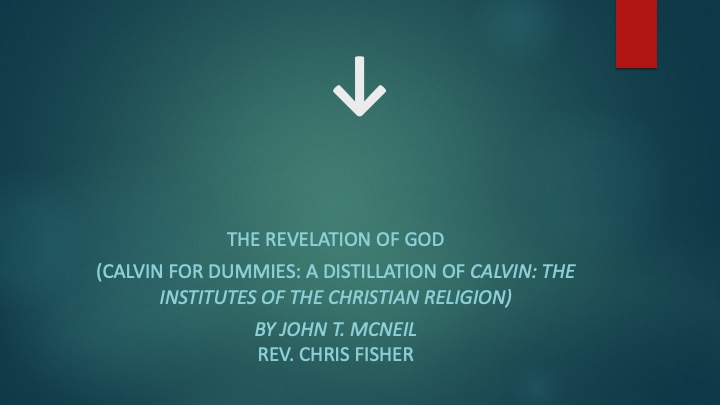
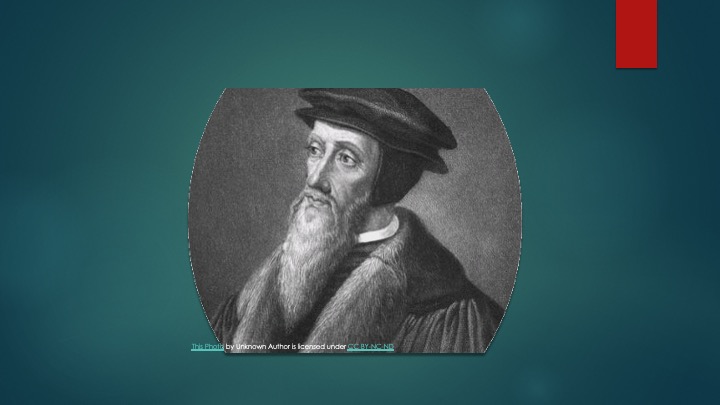
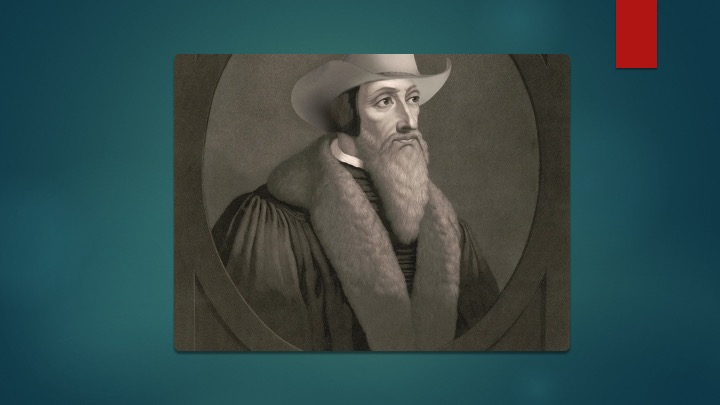
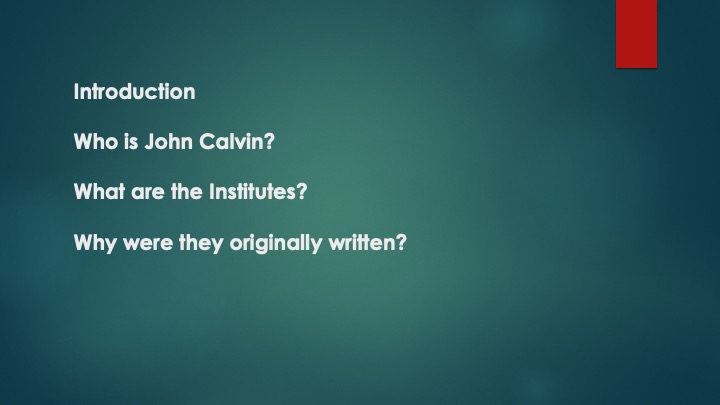
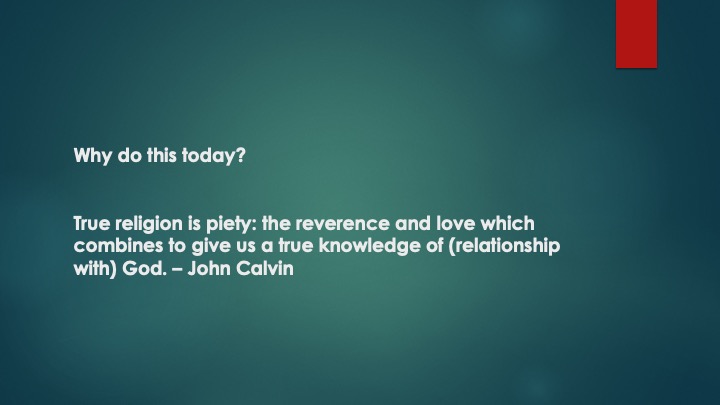
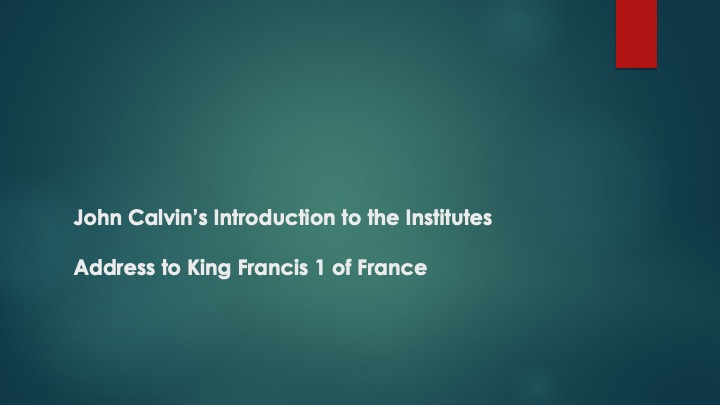
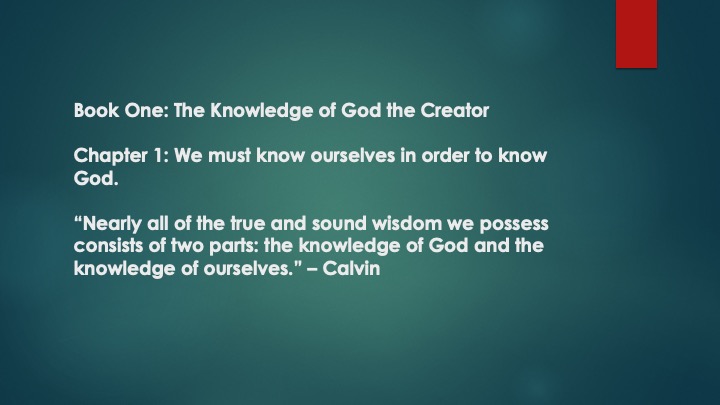
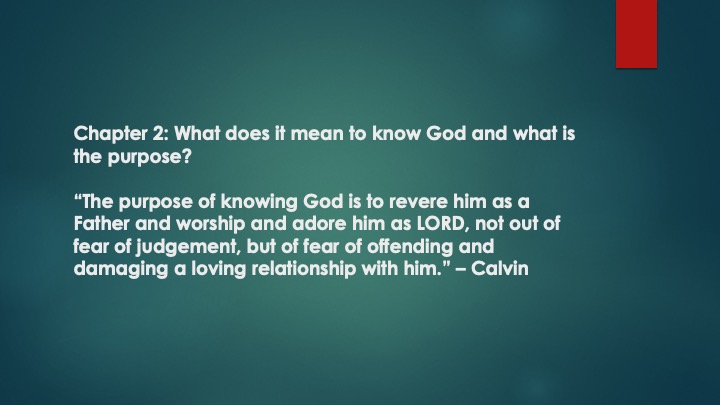
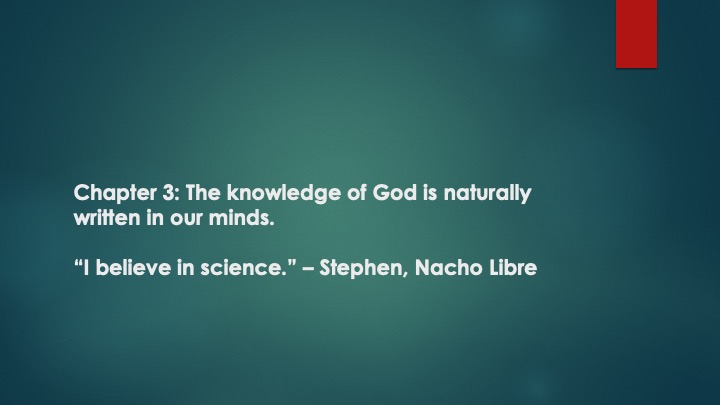
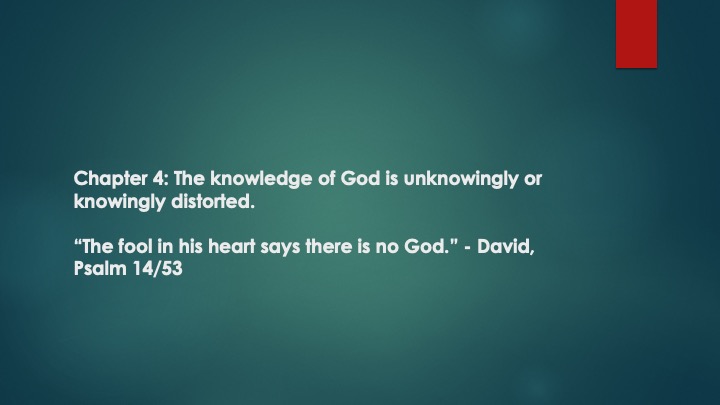
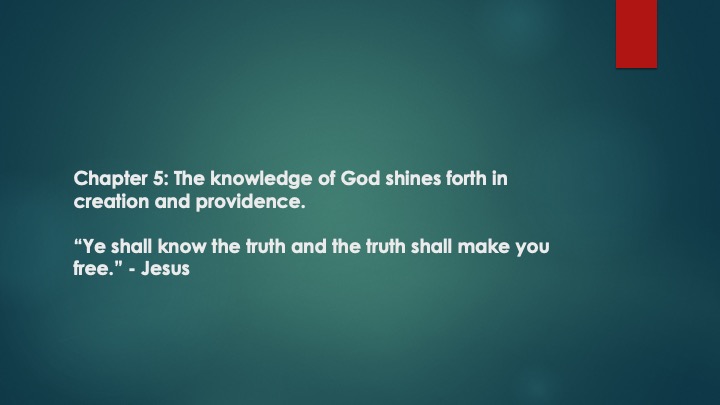
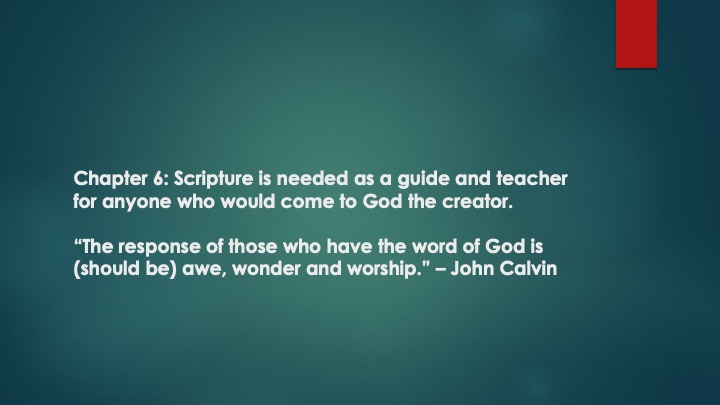
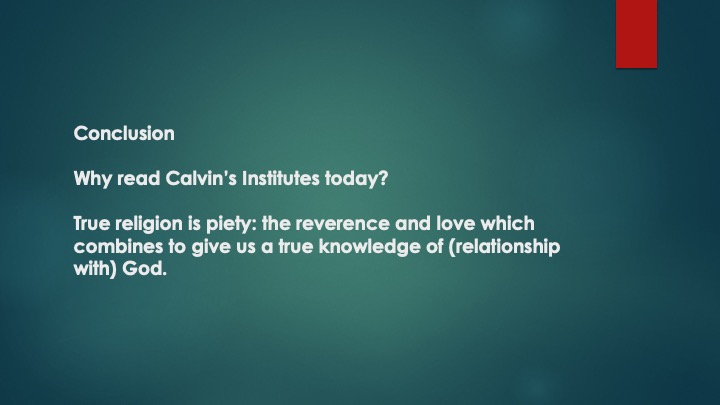
Austin Young Life
Links
< Home Page > < Christian Studies >
As you learned from Chris Fisher's presentation, he has spent much time creating a distillation of "The Institutes of the Christian Religion" originally created by John Calvin. And if you are further interested in exploring that distillation it is reproduced in its present form below. Chris is still refining it and any further amendments will be incorporated as they are added.
Enjoy.
The Revelation of God
(Calvin for Dummies: A Distillation of Calvin: The Institutes of the Christian Religion) by John T. McNeil
Rev. Chris Fisher
Introduction
Distillation is the process of converting a liquid to a vapor and then back into a liquid form in order to purify (water) or strengthen (alcohol). Here is where the analogy breaks down, for in distilling Calvin’s Institutes no purification or augmentation is needed. Perhaps condensation is a better word: reducing the large volume of excellent work (1,800 pages in McNeil’s edition) into a more accessible window to the teaching of Calvin: “Putting the cookies on the bottom shelf”, as my former Pastor David Cassidy would say. The Institutes is a delicious treat that all children who desire good things should be able to reach and enjoy. With this in mind, take a cookie from the cookie jar, taste and see that it is good, then eat the whole batch (or share them with your friends).
Who is John Calvin? Understanding the author and his situation goes far in understanding what he meant when he wrote. John Calvin was above all a pastor: a shepherd of God’s people and a teacher of God’s word. In many ways he was defined by his place in history as a leader of the 16th Century Protestant Reformation. If he could define his own legacy, doubtless Calvin would want to be remembered as one who glorified God in and through the gospel.
John Calvin (Jean Cauvin) was born in Noyon, France on July 10, 1509. A child of the church, Calvin was baptized as an infant and was the son of a father who worked for the church in various official roles. In 1530, while studying law, John came face to face with Jesus, who changed his stubborn mind to traceableness and turned his stubborn heart from superstition toward the gospel. Immediately following his conversion, Calvin began to teach, preach, and write. His work and his associations with other evangelical reformers caused persecution leading him to flee France with a group of friends to Basel (1533). Soon after, Calvin’s first addition of the Institutes were completed (1535).
In the course of time, Calvin sought to journey to Strasburg to continue his ministry of study, teaching and writing. Passing through Geneva, he was detained by William Farel who threatened that God would curse Calvin if he retired to a quiet life of study in urgent times for the church. Convinced that he would be disobeying God and neglecting his people should he decilne, Calvin stayed at Geneva to preach and pastor where he reformed church worship, discipline, teaching and preaching. The Lord used Calvin to care for the growing numbers of protestant refugees fleeing France. Broadly, the church in Geneva sent many pastors to preach the gospel and start churches throughout Europe and beyond. Through many trials and one exile, Calvin served the church faithfully in preaching, teaching, shepherding and writing (commentaries on the entire New Testament and much of the Old) until his death at age 54 on May 27, 1564. His parting words in a letter to his friend Farel were, “Do not tire yourself on my account…It is enough that I live and die for Christ, who is to all his followers a gain in both life and death.”[1] The words of a man who entrusted his whole life to Jesus.
What are the Institutes? Institutes in Calvin’s day meant instruction or education: instruction on the teaching of Christianity would be a better title. The final form of the Institutes closely follows the outline of the Apostles Creed and thereby is a statement of faith. Book One: I believe in God the Father: The Knowledge of God the Creator; Book Two: And in Jesus Christ His Only Son our Lord: The Knowledge of God the Redeemer in Christ; Book Three: Who was conceived by the Holy Spirit: The Way in Which we Receive the Grace of Christ; and Book Four: I Believe in One Holy Catholic and Apostolic Church: The External Means in Which God Invites and Holds us in Community.[2] The Institutes were first written in 1535 (18 years after the beginning of the Protestant Reformation) and completed in the present form in 1559.[3] Fundamentally, the in Institutes Calvin answers the question: Who is God and how can I know him?
Why were The Institutes originally written? Calvin wrote with a goal to make God known to his people through his word. The Institutes were written with multiple purposes by the author to a particular audience at a particular point in history. This fact does not negate their relevance or importance today; on the contrary, understanding the original context (author, audience, situational motivation for writing) sheds light on both historical understanding and contemporary application.
The Institutes are a spiritual, theological document, a pedagogical (instructive) document, a thoroughly biblical document, an ecclesiastical document, and a political document that have broad practical application for individual and corporate lives in Christ today. Calvin wrote first and foremost to glorify God and enjoy him forever. Secondly, He wrote to teach the Scriptures to fellow believers who desired the truth for on Scripture the church is built. Calvin seeks to show people how to know God chiefly through the revelation of His divine Word. Through the testimony of the Holy Spirit working with the Word of God, man can see Jesus and live for him. As a teacher he aims to “prepare ministry candidates for the preaching of the divine Word.”[4] Thirdly, he wrote to address a historical situation, the persecution of Christians in France. King Francis I of France was his audience and Calvin sought to demonstrate that the teachers and believers of the early reformation were seeking to follow Scripture and were unjustly persecuted by the King and Roman church.
Why do this today? Many sincere believers in Jesus Christ who desire to have a deeper understanding of their faith and live for God would not pick up Calvin’s Institutes. 1,800 pages is intimidating! Even those sympathetic to the Reformation tradition of Calvin would just find other more contemporary things to read. My desire is to encourage the faith and life of Christian believers by bringing the practical and biblical teaching of Calvin to the forefront. Calvin was once known as “The Theologian of the Holy Spirit”, the oft neglected third person of the trinity. We neglect the Holy Spirit, his illumination of our hearts to Jesus, and our minds to His word to our peril in the church today. In many cases, the church is bereft of the Holy Spirit and our hearts and the world are bearing the fruit. As the church tries to be like the world to attract the world, she becomes a poor imitation of the world and offers no transformation. In some cases, the church is so drunk with the Holy Spirit and so other-worldly that she has no relevance or connection to her neighbors. Both problems need to be remedied through Word and Spirit.
As Calvin said in his commentary on Jeremiah, “All subjects today are eagerly pursued; but the knowledge of God is neglected.”[5] What was true in the 16th Century is true in the 21st. Many in the world and even in the church know more about things that are passing away than things that endure. Pastor’s have become chaplains and business managers. Lay people are asked to sit and listen (or watch a video) and certainly give money but not do much more in the church. Discipleship and evangelism have almost vanished from the church. Re-acquaintance with Calvin and his life-giving teaching would help us as individuals and the church to know God and how to have joy in living for him.
“God has filled my mind with zeal to spread his Kingdom and to further the public good. I have no other purpose than to benefit the church by maintaining the pure doctrine of godliness,” John Calvin to the Reader (1559). Calvin sought to pave the road to the Scriptures, providing driver’s education to help earnest students of Scripture know what to look for when journeying through scripture. His later commentaries on books of the Bible would be the Google “street view” to the roadmap of The Institutes. It is my prayer that you plan your adventure of glorifying God the Father and the Lord Jesus Christ through His Word by getting a sense of where you are going before you set out on your journey. Let’s journey together for, “I count myself as one who write as they learn and learn as they write.”[6]
Are you a believer in Jesus seeking to know how to live for Him? The Institutes are for you. Are you preparing for ministry and the teaching and preaching of the Word? The Institutes are for you. Are you a Christian, needing encouragement to persevere? The Institutes are for you. The Institutes are for everyone so put your hand in the cookie jar and enjoy.
Austin, Texas May 25, 2018
True religion is piety: the reverence and love which combines to give us a true knowledge of (relationship with) God. – John Calvin
To divide and conquer
is a basic military strategy. It is the strategy employed by Satan and his
minions against God, attempting to trick men into dividing the one into many.
Because man is created by God in his image, this strategy is bound to fail. In
all cultures, whenever men speak from their inmost nature, they commonly refer
to God (singular). The church fathers Tertullian, Justin Martyr, and Augustine
speak the one true God whose image is engraved on the hearts of all men.
Scripture goes out of its way to condemn the gods of the nations. Habakkuk
strongly renounced idols and called men to seek God in his temple in order to
find the one God revealed in Scripture (Hab. 2:20). Despite many efforts of
philosophers, false prophets, and others God is clearly displayed as one in
nature and is Scripture.
Subject Matter of the Present Work (From the French Edition of 1560)
I write so that you may have a light to the path of Scripture – to have an understanding of what the Holy Spirit wants to teach us in His Word – all for His Glory. Read the Bible (Old Testament as well as New), memorize it and test all that you find here in light of the testimony of Scripture.
Prefatory Address to King Francis I of France
1. Why did I Write this Book?
To shape zeal into true godliness; addressing those who do not want to receive sound teaching, who even persecute those who believe the truth.
2. Plea for Persecuted Evangelicals
Primarily, I want you to think about these questions as I do: How can God’s glory be preserved on the earth? How can God’s truth in His Word keep its rightful place of honor? How can Christ’s Kingdom be preserved today? For you as a king, I want you to recognize that you are a minister of God charged with governing His kingdom.
I have confidence that what we teach will prevail, towering over the might of the world because it is not based on our power, but on the living God and Christ whom the Father has appointed the King to “rule from sea to sea, and from the rivers even to the ends of the earth”, Psalm 72:7-8. Our belief and methodology is this: that Scripture interprets Scripture (Romans 12:6). That all wisdom rests with God, and we teach salvation and eternal life through Jesus Christ to His glory alone. We are opposed by those who think otherwise, the fat who dwell in the kitchen of their tradition, eating from the pot of those who put more weight on what the Church says than on what God says in his Word.
3. Charges Against Us Refuted: Your teaching is: New, Uncertain, and has No Miracles
There are many who criticize the movement back to the glory of God and his word (the reformation). Their cheeks are bloated with accusation, their charges include: this teaching is a novelty going against tradition, it causes division, and is not supported by miracles. To these things I will briefly speak. As far as being a new teaching, I am only teaching what was taught in Scripture, that justification is by faith in Jesus Christ alone (Romans 4:25). If the teaching of the gospel seems new, it is because it has been buried by men, not by God. If the pearl of great price of the gospel is recovered, it should be secured and a party thrown! This so called new and uncertain teaching not upheld by the customs of the church will stand. Ask the opponents of the gospel if they are willing to shed their blood for their traditions and see what they do. We are not afraid of man nor God as we stand on the righteousness of Christ alone.
As to miracles, the gospel that we preach was attested by Jesus and the apostles by signs and wonders (Mark 16:20, Acts 14:3). It is the same gospel that has already been affirmed. Amazingly, the church today continues to do miracles; even dead saints bodies perform unbelievable acts. Is this required to confirm the word of truth that remains unchanged? Investigate the substance of what we are teaching in light of Scripture and you will see that our doctrine is true. We live and teach to the glory of God. Why do they perform and demand miracles? Did not Satan, magicians, and false teachers rely on miracles to deceive many (2Thessalonians 2:9-10)? The supposed miracles of the church are for their own glory, not for God’s.
4. Misleading Claim that the Church Fathers Oppose the Reformation Teaching
Those who believe that the teaching of the reformation is against the teaching of the church fathers are wrong in their interpretation of the fathers. They are like those looking for dung amidst gold – picking out the bad teaching and leaving the good. The teachers of the reformation uphold the teaching of the fathers so far is that teaching is upheld by scripture. In the areas that the fathers diverge from scripture or contradict each other, I say let their teaching be weighed in the balance against God’s word. If the Roman church is in alignment with the fathers, why do they contradict the fathers in their teaching and practice? In lavish wealth, in excess, in requiring fasts at Lent, in requiring clergy to be celibate, they violate the fathers. Their biggest transgression is putting the authority of the church above the Scripture, which the fathers did not. It would take volumes of books, months and years to record all the ways the Roman church has rejected the fathers.
5. The Appeal to Custom Against Truth
Appealing to custom has no weight. Just because a group has been following tradition for a certain amount of time does not make the tradition right. The church ought to follow God’s word in standard not customs which change and may be evil. Even if the whole world followed and evil custom (like all men in the time of Noah save him and his family) it would not make it right. Following God as revealed in his word is the only proper custom to adopt.
6. Errors About the Nature of the Church
The church of Jesus Christ has lived and will live as long as Jesus reigns at the right hand of the Father.[7] We have no fight with the church – we are one body of one faith worshipping one Lord (1 Cor. 8:6). The problem is with their view of the church. They see the church as buildings and offices and a visible hierarchy. We perceive the church to be invisible. Entry into the church invisible comes through a two hinged door– the preaching of the word and the administration of the sacraments. The Lord alone is the doorman who admits those who belongs to his church (2 Tim 2:19).
The visible church in Rome is filled with idolatry and errors just as Aaron and his sons caused Israel to sin in the golden calf (Ex 32:4); or Ahab’s prophets followed after false Gods (1 Kings 22:12); or the false prophets in the time of Jeremiah who held power (Jer 18:18). Even Jesus was falsely accused and condemned by the visible leaders and followers of God (John 11:47)! To hold on to a visible church that is corrupt, contradicts itself, harms God’s people, and is in opposition to God’s word is deadly, ruinous and leads to the destruction, not salvation of souls.
7. Tumults Alleged to Result from Reformation Preaching
The only reason that conflict has arisen with the teaching and preaching of the reformation is that the devil has been awoken from his slumber. When the church was enslaved by the prince of this world, he could rest easy on his throne. When, however, the preaching of the gospel of Jesus Christ in his holy word rang forth, he feeling threatened, sprang into action. The work of the devil brought violence and opposition against the preachers of the truth. The work of the deceiver brought divisions and arguments over theological minutia. Elijah was accused of troubling God’s people (1 Kings 18:17); Jesus was a troublemaker (Luke 23:5, John 19:7) and the apostles caused a tumult with their preaching of the resurrection (Acts 24:5). Following in this vein, the reformers spread truth while their opponents bang gongs and clang symbols against God’s power. The apostles pressed forward in preaching the truth in the face of opposition knowing the all the clamor was about Jesus. He is the stone of stumbling and the rock of offense (Rom 9:33). We stand on Christ and his word and have assurance in him even as the world shakes and totters.
8. Let the King Beware of Acting on False Charges: The Innocent Await Devine Vindication
Do not be persuaded, O King of the false charges that we preach a new gospel that seeks to divide; because our God is the God of peace (1 Cor. 14:33). We do not wish to topple nations and kingdoms but have lived in peace and uprightness. Even though we have been persecuted and exiled, we still pray for you and your kingdom. We seek to honor Christ in our life and our death (Phil 1:20). Please give a hearing to our case and read the following words what we believe. Do not listen to the lies of the accusers who are against us because they are against God as well. Even if you decide against us we are confident that the Lord will deliver us from affliction and bring justice to our accusers.
May the Lord, the King of Kings establish your throne in righteousness and your dominion in equity, most illustrious King.
At Basel, August 1, 1536.[8]
BOOK ONE: The Knowledge of God the Creator
Chapter I: We must know ourselves in order to know God.
1. Unless we know ourselves, we cannot know God
Each year, people spend millions of dollars on counseling and self-help in order to seek better understanding of self and purpose. Do you want to understand who you are, your purpose in life? Look at God. Do you want to understand God? Know yourself and God’s creation. “Nearly all of the true and sound wisdom we possess consist of two parts: the knowledge of God and the knowledge of ourselves.”[9] Yes, John, we know you said that; but how can we really know ourselves or God?
What is knowledge? For most of us, this is easy, it is… what is knowledge? Dictionary.com is helpful “acquaintance or familiarity gained by sight, experience, or report.” Knowing God is not merely an academic exercise; but is an intimate familiarity – a relationship. It is the difference between merely reading a book for the facts, like the Bible (which means The Book) and reading it to know the author, to understand that he wrote the book to me so that I would know his love, trust him, and live for him. Reading the Bible as a love letter from God to His people – to you! This is why God reveals himself to us.
This leads us to Calvin’s and our primary focus, revelation. (Not the book of the Revelation of John, the last book of the New Testament, but revelation with a small ‘r’). How can we know God? Only through revelation. What is revelation? Dictionary.com again, “God's disclosure of Himself and His will to His creatures.” Revelation is self-disclosure – God reporting to us what he is like. Good reporters always dig for the facts and talk about human interest stories. In this case, God, being the only wise God, has the facts and takes the time to reveal to us the truth about himself, us, and the world. God is the Creator, and we are his creatures. As a good and loving heavenly Father (as Calvin often calls God) he takes time to hold our hand and show us who he is and how we are to relate to him and his creation. Because we are weak, sinful, and make mistakes, God takes the burden of showing us, through his word how we are to live and relate to him. “In knowing God, each of us also knows himself.”[10]
2. Unless we know God we cannot know ourselves
Imagine we are in a class and have the unique position of being the teacher, the grader, and the student! We give the lectures, write the test, take the test and grade the test. Unless we are the most ignorant ass, we will make an A+. This isn’t difficult. If we judge ourselves by our own standards (being both the judge and the jury of our own character) we will look great. However, if we look in the mirror and see the face of God, we will recognize the spots, blemishes and asymmetry in our own faces in contrast to his perfection. There are many famous videos of ‘guys who are good at basketball’ who challenge NBA stars and are ‘taken to school’, shown that they are not good at all, but they actually stink. When we look to God our false pride and hypocrisy is exposed; our supposed strength is revealed as weakness. He takes us to school, and we realize that we stink. Thankfully, he is a loving schoolmaster, with one assignment: know thyself.
3. Man before God’s majesty
Majestic, the multi-hued sunset going down into the Pacific Ocean; a soaring dunk by LeBron James; the royal bride in her wedding gown: these images and more are truly majestic. Majesty is impressive stateliness, dignity, or beauty. It is also royal power. All of these words and more dignity, beauty, royalty, and power describe God.
When people in the Old Testament come close to God, they are afraid, undone, forced to their knees. Isaiah saw a vision of the glory of the Lord in the Temple and cried, “Woe is me! For I am lost; for I am a man of unclean lips who lives among a people of unclean lips; for my eyes have seen the King, the LORD of hosts!” Isaiah 6:5. Similarly, Moses (Exodus 3), Job (Job 38), Ezekiel (Ezekiel 2), Elijah (1 Kings 19) and so on. Were we to meet our celebrity idols, we would tremble, become speechless, awestruck that the person we have seen on the screen, at concerts, or on the playing field is right there in front of us. In short, we are undone and don’t know what to do when we connect with greatness, glory and fame. This is what happens times one hundred when people see the majestic glory and holiness of God. They are undone, dressed down, ankles broken, splayed out on the floor.
Chapter II: What does it mean to know God and what is the purpose?
1. We must revere and love God to know Him[11]
There are many stories of adopted children, who as they age to adulthood, strongly desire to discover and meet their biological parents. Naturally, people want to know where they came from, who made them, the background of their family history. The reality is, that unless the biological parents desire to be known and allow contact this will sadly remain a mystery. So why would we want to know God? For the same reason. Because he is our creator and redeemer – even our loving heavenly father. (This section will deal with the first, looking at God as the creator, while seeing Him as redeemer will come later). We want to know our origins, our purpose, and our future.
It is important to note that because of sin (our state of being (nature) and wrong choices that separate us from God) we cannot know and see God as a good, wise, caring, loving creator on our own. Our powers of observation of ourselves and God’s creation are not good enough to show us who God is clearly, because we are blind, deaf, and dumb in our sin. It is as if we have begun driving on a cold, winter morning before clearing the windshield of frost. We won’t see clearly where we are going and driving puts us and others in danger. Thankfully, God has pulled out his ice-scraper and chosen to reveal himself. His first tool of revelation is creation.
2. Knowledge of God involves trust and reverence
We struggle to see God because we often ask the wrong questions. Two-year-old’s who are just beginning to talk are famous for this. “What?” is often the question and answer for everything. Similarly, as we ponder God we often start by asking, “What is God?” Perhaps this is the question that comes to mind when many think of theology (the study of God). But this question is not helpful. It is like asking our partner on our first date to show us their DNA map. “What are you in your cellular essence, dear?” How romantic! If we ask this question, we will not truly get to know them as a person and we are not likely to get a second date.
Who is God? How does he show us by his words and actions who he is? Is he trustworthy, loving, and good? How can we know him, trust him, love him and honor him? These are better questions to consider; questions that will show us God. Questions that will change our lives; questions that will change the world. When we ask these questions, we are asking about God to know him, to fear him, to worship him in reverence and awe.
Because he made us, how can we learn to trust him and look for every good thing from his hand? Good question. As we get to know him as Father, how can we live to please and honor him? Great question! Why is God so patient with us and with others who do wicked things in the world? Good, now we’re getting practical about God and our lives in the world. The purpose of knowing God is to revere him as Father and worship and adore him as LORD, not out of fear of judgement, but of fear of offending and damaging a loving relationship with him.[12] We have a positive goal in mind to know God in order to relate rightly to him.
Chapter III: The knowledge of God is naturally written in our minds.
1. What does it mean that it is natural to know God?
Every computer comes with solid state memory (a hard drive) programmed to do certain things, to recognize and interact with software, to enable it to function as intended. We are similar. In the very core of our internal processor, we are made to know and live for God. Calvin says, “There is within the human mind, and indeed by natural instinct, an awareness of divinity.”[13] We have the capacity to understand that there is a God and that we are his creatures. Nevertheless, many of us act like the ugly duckling. As a swan egg, we mistakenly rolled into the nest of ducks, when we hatched there were ducks, when we walked and ate and swam and flew there were ducks. We naturally think we are ducks. (Ducks being people without a creator). Until we look at our own reflection in the mirror-like lake and realize that we aren’t big ugly ducks at all, but beautiful swans.
God supplies the mirror – it is his creation – and we can begin to make out that we are beautiful creatures hatched by a beautiful creator. Unfortunately, when we realize we are a big, beautiful swan we begin to be proud, to look down on our duckling little brothers and forget that we have been made beautiful and can take no credit. It is natural to know God because he made us in order to know him.
2. Is religion made up?
Religion is a dirty word, it incites strong emotions; for some of us, it makes us want to shut this book. So much evil in the world has come from religion. Religion has been famously called the opiate of the masses; invented by conniving rulers to keep us down. If this is true (and I don’t believe it is) then why use religion – or the supernatural belief in a spiritual being – to attempt to deceive? The reason is that the crafty political and religious rulers know that we all have something within us (a seed of religion) that tells us that there is a God. Like expert marketers they play on our natural desires. Why play a pizza commercial at dinnertime? Because we will all be hungry. The seed may be buried deep in the hard ground; but it is present, and they know it.
Many, like Stephen, the blundering side-kick of the Jack Black movie Nacho Libre, “believe in science” (a noble if misguided creed); not religion, not God, not the supernatural. Many of these same people go out of their way to disprove the existence of God; are angered by the idea of religion; pity simple backward religious folk; and dedicate their lives to speculative philosophies masquerading as science. Thankfully, science and religion are not mutually exclusive. To believe in God is to believe in science. In fact, God believes in science, he made all the subjects of science and gave us a curiosity and ability to study and understand them. Why do some try so hard to discredit religion or God? Why are they so condescending, hateful, and angry? Because digging up the seed of religion in their own hearts and in the hearts of others is as impossible as it is painful because it was placed there by the creator. They wear themselves and us out by trying to deny the nature of things. Although many false religions are the product of deceitful men, true religion is not made up.
3. Is it possible to be truly godless?
The way some celebrities, athletes, and politicians flail about in life and on social media it would seem that godlessness is their glory and goal (and their fans mimic them). Can they actually achieve it? If it is the nature of all to know God, then thankfully no – no one can be completely godless. Even though some of us will try to deny the existence of God, as noted above, and even dedicate our lives to disproving spiritual realities, we will fail. Something inside of us (call it conscience – the little voice that tells us the truth and encourages us in good and convicts us of evil) will always contradict what we say with our mouths and do with our hands. “If all men are born and live to the end that they may know God,”[14] to deny God means to deny ourselves. This is unsustainable, like a divided house or a dysfunctional workplace. The result of this will be brokenness: confused minds, damaged hearts, stifled emotions, and broken relationships – in short, misery. If we are made to be like God holy and immortal, we must worship him not ourselves or our creation. Being human means that we are made to know God, therefore no one can be utterly godless.
Chapter IV: The Knowledge of God is Unknowingly or Knowingly Distorted
1. Superstition or self-imposed blindness
Gardening is a favorite hobby of many, and of God. He plants the seed of his image in the heart of every man (person). Even though a seed of religion (knowledge of God) is put in the heart of all men, very few grow the seed into a mature, fruitful plant. Instead of cultivating the seed by placing it in the water and sunlight of God’s word and Spirit they remove it to a dry and dark place. They do this knowingly and yet curse God when the plant does not grow and bear fruit. Another analogy is one of measurement. Rather than measuring themselves and God with his own measuring device - revelation, they take out their own yardstick and measure God in comparison to themselves. Measuring God from the ground up causes a loss of perspective, and many like it this way. “What if God were one of us, as small as one of us?” Certainly, if we are made in God’s image, God must be like us, right? Wrong.
This misperception is actually self-imposed blindness, a third analogy. It is like going to the eye doctor and asking not for glasses to see better but for glasses that see worse – even dark enough to blind. Taking steps with blinders on causes people to fall into a pit of their own making. As Paul points out in Romans 1:21-22, people who do this become blind, foolish, and futile in their thinking. In substitute for seeing God, they see themselves and the image staring back at them is dark and lifeless. Being blind does not stop them from claiming knowledge and measuring God according to their own small standards. This brings some comfort to know that God is someone who can be fashioned according to their own senses and understanding, however misguided.
2. Conscious turning away from God (voluntary blindness)
Have you ever followed a blind man? Doing so would be an absurd, perilous journey. Walking in the blindness of denying God leads to deeper darkness. “The fool in his heart says there is no God,” says David is Psalm 14:1, 53:1. Continual denial that God can see, can rule, can discern and judge leads the blind to ascribe their own condition to God. If God is blind and does not see our sin, and or if he is locked in heaven and cannot do anything about sin; then there is nothing to fear (Psalm 36:1). The person blind to God becomes his own guide and if charismatic, attracts followers who walk in darkness as well (like the Pharisees Matthew 13:14-15). God, being blind himself, does not notice them and they go on their merry way. Because the self-blinded are made in the image of God, even as they cast out the LORD they often fashion their own god. This self-made god is like them, blind. It is a god without eyes to see; a god who brings no accountability, discipline, or judgement. Some more aggressive blind men are bent on challenging God directly, seeking to topple him from his throne. The arrows they shoot at God miss the mark as being blind, their aim is poor. Their arrows aimed at the heavens eventually fall on their own head or the head of their neighbors (the science of gravity is in fact true). This obsession with overthrowing a God who is blind and powerless reveals the folly of those who deny his existence, care, and power leaving them in a perilous state for they (like the bully) have picked a fight they cannot finish.
3. We are not to make God in our own image
Classical sculptors sought to represent the beauty of creation in stone or metal. Many modern sculptors often distort what they see (or more likely see the creation through distorted eyes). The same is true for our hearts with our God or gods. The benefits of religion are nothing if not joined with the truth. Whether we worship one God or many, if we fail to worship God according to his unchanging character given in his revelation (the Bible) then we worship an idol. For most, that idol is themselves. Worshipping according to our own imagination turns in on itself and becomes a show where we are the star and not God. The Apostle Paul ascribes this to ignorance in Galatians 4:8 and Ephesians 2:12. Lacking knowledge of the true God leads us to invent our own gods and the rites that might please him/her/it. Because created gods are false, they are merely a function of our own imagination and ego. Therefore, misguided worship is merely pride; another way for man to puff himself up. No religion is authentic unless it is guided by and joined with truth.
4. Hypocrisy, the shadow of true religion
Everyone knows that religious people are the biggest hypocrites. The sin of hypocrisy is added to idolatry. Those who worship falsely believe that their deeds of worship are enough to assuage God even though their heart and their life run from him. False religion is hypocrisy, and any act dependent on the strength of the worshipper to make sacrifices to God to atone for their own sin is false. Hypocrisy – living a life of sin with a heart far from God while performing religious acts (like going to church or giving money) – is opposed to true religion.
True religion is piety, the reverence and love which combines to give us a true knowledge of (relationship with) God. True religion comes from the heart and is a gift implanted by God the Holy Spirit. In contrast, hypocrisy is the shadow of true religion. Dwelling in the shadows is denying God. Honoring God with our lips while our hearts are hidden far from him leads to cooling and hardening of those hearts. Eventually, shadow religion damages the seed of the knowledge of God, causing it to produce bad fruit.
In summary, a sense of the knowledge of the true God is encoded in the hearts of all people. In good times, those who deny that they know God joke about him and actively deny him. In bad times, those who deny him hide in cringing fear or make sacrifices to him (or to some god) to try to placate his wrath. Whatever circumstances and responsive actions of the blind who deny God are in fact indicators that they are not completely ignorant of God. Stubbornness of mind, running away from him in sin, and hardening of hearts stifles the growth of the seed of the knowledge of the true God implanted in all people.
Chapter V: The Knowledge of God Shines forth in Creation and Providence
1. The clarity of God’s self-revelation removes excuses
You can tell a lot about a person based on what they wear; a well-attired person getting first and often second looks when they walk into a room. First impressions are lasting impressions. The same is true for God. The LORD God who is blessed forever wants his children to be blessed (happy). He is rich in beauty, splendor, power and blessedness and makes that clear when he walks in the room. All people everywhere can see God; not directly looking at him for naked eye sight of God’s naked glory would bring blindness and death (Isaiah 6). God can be known by looking at him through the mirror of his works (his creation). The world which God has made is his mirror through which all men can see God (Heb. 11:3).
The Lord enjoys camping. He has pitched his tent in the heavens and revels in the beauty of the moon and stars which he has made. Each night around every campfire in every village around the globe, he invites all his children to behold his beauty and glory in the sky (Psalm 104: 2-4). The language that the Lord speaks is universal, shouting out to all people everywhere, “Notice me, I am here in the camp with you!” (Rom. 1:19-20).
2. The divine wisdom displayed for everyone to see
“Ye shall know the truth and the truth shall make you free”, John 8:28 etched in stone on the main building of the University of Texas. The Lord is the president of the university; expert in etching his wisdom on the minds of men through all subjects. The wisdom of God is displayed clearly for everyone to see. For the scientist, God lays out order, wonder, and glory in the exacting details with which he ordered life – even at the most microscopic and telescopic levels. The Lord is a great teacher of rhetoric and the liberal arts – all of which show forth his wisdom. Even the ones who fail to enter his classroom God teaches through his creation. God is the artist, revealing his pointillistic glory in the ordering of the stars. He is the great physician, displaying in the anatomy of the human body: glory, symmetry and functionality.
3. Man is the highest proof of divine wisdom
Whenever something is lost, it is first looked for in close proximity (in pockets, under the car seat). Likewise when God is lost, he can be found by looking nearby (even in the mirror or in the heart). Man (men and women) is a microcosm, an image bearer of God that contains wisdom, creativity, power, and thoughtfulness. He is able to find God just by looking inside himself (Acts 17:27). This is what David did in Psalm 8. As he looked at the glory of God in the macro-cosmos (the universe) his eyes turned immediately to the mirror. Man, even infants are able to know God. Infants can preach – declaring God’s glory at their mother’s breast (Psalm 8:2) silencing the enemy who seeks to veil God. Infants make great lawyers and debaters too; their suckling and gurgling offer more articulate arguments for their life and hope in God than the most ‘educated’ arguments of lawyers and scientists. It doesn’t require special revelation (knowledge of the Bible) to see that we all come from God (Acts 17:28). He is our Father. Man will give himself freely to God his father to love and worship him as he tastes more of his father’s love and care.
4. But man turns ungratefully against God
People love giving and especially receiving gifts. To receive a great gift and discard the giver is a great error of ungrateful pride. This is what men do with God. He has given a great workshop full of tools for creating in the world and man builds and takes credit for it all. He has filled the storehouses with abundance of provision and we consume and take all of the credit. He has given gifts to men to do all sorts of tasks and man revels in the glory, never giving thanks to the giver. Instead of using the gifts for God he hides and conceals them robbing himself, his neighbor, and others of a chance to worship God.
Man has taken God’s resplendent robe and gives it instead to nature and science for being author of all good things. Men of science observe the details of body and soul receiving awards and pride for discovering new insights. Intelligence and fame leaves no room for thankfulness to God. The wonders of the human body and soul should highlight the creator behind it all; instead the knowledge of God is buried and the ability of man is put on a pedestal.
5. The confusion of creature with Creator
Building a house requires the creativity of an architect, the planning skills of an engineer, the organizational skills of a contractor, and the skillful work of craftsmen. Houses do not build themselves, there is a builder or builders behind them. So too with nature and man. God is the planner, the builder, and the maintainer. Nature is the order prescribed by God. To confuse God with what he has made is an error. How can the universe create itself? There must be some first cause. What about man? If man has an immortal soul, must there not be an immortal God? If man has the power to examine the stars, to create all sorts of inventions, to imagine and plan for the future, does this not point to a God of wisdom and knowledge behind this intelligence. If man dreams dreams and has thoughts even in sleep, does not this point to an awake God who is watching over all? If man can discern right and wrong in his conscience, does not this point to a good God who will reward the good and judge evil in the end? All of these truths about man point to the fact that there is a God who made man and all the earth.
6. The Creator reveals his lordship over the creation
Great artists create pictures that are both beautiful and recognizable. As the ultimate artist, God sketches a clear picture of himself in his creation. Looking closely at God’s artwork shows his eternal power to create as well as his kindness in ruling over all. The flashing lightening and booming thunder of a storm display God’s power. The calm after the storm shows his grace and peace. The wind and waves of the thrashing sea are an awesome sight; and the calm lagoon of an island is a peaceful haven. Both point to God. God’s eternal power is displayed in his creation and his care and mercy on all he has made should bring awe, wonder and praise from his creatures (Psalm 145:9).
7. God’s government and judgement
George Washington served both in the creation and governance of the United States. Likewise, God not only creates but is also present in leading the lives of his people and their societies. In his administration or rule, God shows justice, patience, kindness, mercy and grace. Sin is punished in communities through civil law; however, not all sin is punished and evil men often prosper in this life. On the other hand, righteous men experience blessing and peace, but they also suffer oppression and injustice. Where is God in all of this? He is at work in the world to show his kindness, patience and mercy as he pursues sinners to in all circumstances to call them to see him as a good, good father.
8. God’s sovereign sway over the life of men
Many love to root for the underdog (any Cub fans?). The triumph of the weak over the strong is unexpected if not unhoped for and points to something greater at work. God is like this, always watching over the poor, the weak, the lost, the unlovely. Psalm 107 is a picture of God’s redemption of those in difficult, almost impossible circumstances. Everyone has been in an impossible circumstance and yet has lived to wake up the next day. This is a picture of God’s mercy and care and is recognized by people only about one percent of the time. Conversely, the fall of the strong also points to some greater force. In Psalm 113 the powerful and proud are brought low and the humble and lowly are raised up. This is a picture of the upside-down kingdom of God at work. Even the plans of the wicked against the weak are turned to God’s purposes – this is what God does to show his mercy and grace (1 Cor 3:19).
9. We shouldn’t rack our brains about God, but rather contemplate him (his word and his works).
Relationships break down when people spend too much time “trying to figure someone out”. Relationship with God is the same way. Brain energy is wasted speculating about his eternal essence and what he might or might not be like. Instead of using brains, eyes and hearts will suffice. Eyes can see God’s power in his works (what he does): his creation, his care, and his rule. Hearts are changed by the power of God’s Spirit and eyes are open to see his work in the world. God has come near to reveal who he is through what he has made. Walking with open eyes and open hearts to God’s work in the world and within us will bring more joy than endless philosophical speculation. Paul points out that the Lord is near to each one of us in Acts 17:27-28. Instead of using a powerful telescope to discover God in the universe, we need a cardiogram to find the one who dwells inside of us. This is not to discount the mind. The mind, the senses, and the heart can all observe and recognize God’s greatness and glory in all his works (Psalm 145).
10. The purpose of this knowledge of God
God is the most renown painter in the history of the world. Everything God has done has been put beautifully on a canvass large enough for all to see. To see and comprehend God’s eternal power, creativity, love, and care displayed should make admirers of all men. Worship of the artist in this case will bring happiness and eternal life; this is the purpose of knowing God. Both God’s patience with the sins of the wicked (the stuff bad people get away with) and discipline of those he loves (the stuff good people get busted for) point to both a future judgement and a future hope. Admiration of the painting of God’s works must be internalized to truly appreciate how it impacts our life. Wisdom is looking for God in the midst of and having a vision of him beyond circumstances.
11. The evidence of God in creation does not profit us (because we don’t pay attention)
A Texas man in the last century struck a gusher oil well, but because he had no means to cap the well, he watched all of his profits flow down the hill and into a nearby creek. God has gushed forth his character and his kingdom but many watch them flow by without recognizing him. Even the most thoughtful men do this. They search and they seek the depths of detail of creation but they entirely miss the creator. When blessings of gifts come their way, they ascribe them to chance, luck, or fortune not to God’s providence. Even if a man notices God, he will eventually pervert his blessings and forsake God for various idols. If scientists, philosophers, and teachers stumble in this way, their simple-minded students will follow. The madness of ascribing all good things to luck, chance, and fortune robs the glory due to God alone.
12. The manifestation of God is choked by superstition and error
Mazes are fun but they are designed to confuse, misdirect, and trap those who enter. The search for God in the mind of a man is like entering a maze. The more man seeks after God in his mind he becomes misdirected, confused, and trapped in error. When the exit to the maze is found, it leads to an idol, not to God. Similarly, the mind of men is like a spring that bubbles up an unending stream of gods. A list of the things worshipped in the world by men would cover the earth and reach far up to the heavens. This is superstition – gods created by man.
Philosophers dedicate their lives to the search of truth - truth about the nature of things and of God. The diversity of gods dreamed up by philosophers through the ages and the resultant religious practices is unending. Some who recognize the futility of trying to identify various and sundry gods seek instead to deny and disprove God’s existence. Since wise men have brought much pain and suffering from trying to identify gods perhaps it is better to focus on denying that God or gods exist, they reason. Looking to nature alone is insufficient to uncovering God and can lead to (as Paul encountered in Athens) the worship of the unknown god (Acts 17:23).
13. The Holy Spirit rejects all cults contrived by men
Following traditions in loyalty to sports teams is one thing, but following traditions in selecting whom to worship is altogether more serious. Tradition only takes one so far. Cults (false religions) are built on community identity and tradition. Worshipping a god according to the tradition of family, ethnicity, or nationality is not enough. How can the tradition of mortals define God who is immortal? Only the power of the Holy Spirit working in the heart of man through the word of God can reveal the only God worthy of worship – the God and Father of our Lord Jesus Christ. Even the Samaritans in Jesus time, who came close to worshipping God missed the mark (John 4). Only the wellspring of the Holy Spirit through the word of Jesus could bring true belief and worship. God must reveal himself in order to bring true worship.
14. The manifestation (revelation) of God in nature speaks to us in vain
Imagine a man is blindfolded, taken to a vast wilderness in the dark, spun around and told to find his way home with only a small flashlight to guide you. The flashlight may help to find a few paths through the trees but will in no way be sufficient to lead him home. The same is true of creation. The Lord has left a witness in the things he has made in order to leave men without excuse for seeing that God exists (Rom 1:19). That being true, the creation itself is not enough to draw men home to the Lord (Acts 14). Only the light of faith is strong enough to illumine our hearts and shine on the glory of God in the face of Jesus Christ.
15. We have no excuse
Everyone had a teacher who would never accept late work under any circumstance. Loss, ignorance or natural disaster were not acceptable excuses to gain from the teacher the grace of a second chance or a passing grade – only a zero. The fact that men fail to see God in his creation leaves them without excuse. Even though animals give glory to the God who made them; man created in His image feigns ignorance. God’s creation beacons man home but he chooses instead to live under a bridge. Instead of looking outside to the God who is there, men look inside to their own feeble thoughts to grasp glory from God. The weakness and blindness of sin in man leaves him without excuse.
Chapter VI: Scripture is Needed as Guide and Teacher for Anyone Who Would Come to God the Creator
1. God bestows the actual knowledge of himself upon us only in the Scriptures
Trusting in creation alone to guide men to God is like tanning in the moonlight – a person can lay out all night but remain pale. The Scriptures are the brighter light of the sun that brings warmth and positive results. God’s word reveals himself to his children and gathers them like a mother hen gathers her chicks. Like glasses given to a blinding old man, Scripture (more so than creation) brings clarity to see God in place of blurry marks on a page. God opens his lips in his word to draw men to himself. God’s word (Old and New Testaments) was given to gather his people and remains a direct and certain mark by which his people see and trust in him. God’s word alone shows clearly that He is the creator and redeemer of man. When searching for God Scripture is like Google, the trusted search engine that will bring results.
2. The Word of God as Holy Scripture
Silent films amazed audiences in the 1920’s; but with the onset of sound soon after, moviegoers were invited deeper into the story of the film director. Creation is a marvelous theater in which to see God’s works, but Scripture speaks the words of God in order to draw people by the ear into the story of redemption. The patriarchs, Moses and the prophets had the truth of God engraved on their hearts and He led them to preserve it for their posterity. Through the recording of His word, God made himself and the path of faith in him clear – repentance and faith in Jesus Christ alone. Becoming a student of Scripture is the path to faith in and obedience to God. God in his kindness has made the way for faith and life for his people through giving them his word.
3. Without Scripture we fall into error
Weeding is profitable only if fresh plants or seed is restored, otherwise weeds will spring up again. All hard work and striving to know and live for God are like weeding, vanity without His Word. Looking for God without his word is like taking the wrong subway line. If the destination is on the green line, taking the red will never succeed. Only God’s Word leads to God. All other paths, including creation, are slippery slopes leading to errors. Going slowly along the path of Scripture is better than running along any other path. God is the Lord of heaven and earth – the King. His rightful rule is established in the hearts of men and on the earth through Scripture alone.
4. Scripture can communicate to us what the revelation in creation cannot
The voice of God goes out to all men through his works of creation (Psalm 19, 29, 93). The response of those who have the word of God is awe, wonder, and worship. Without God’s Word to guide and interpret the signs of his creation, no man can come into an intimate relationship with God. Instead he will stagger about like a drunk in a bar in vanity and error: vainly boasting, breaking glassing, causing fights, and ending up in the gutter.
Chapter VIII Scripture Must be Confirmed by the Witness of the Holy Spirit Alone
1. Scripture has its authority from God, not from the church
The last will and testimony of a person gives surety to his beneficiaries of what riches they are to receive. The heirs do not need to hire a palm reader to summon the spirit of the dead to discern his will. Likewise, the Lord (though still very much alive) has preserved his truth in Scripture alone. We need not seek daily oracles from God to know him or his will. Who determines what is Scripture? Some argue that the church must affirm and confirm what belongs to Scripture. This is putting the authority of men over the authority of God. Only God himself in the person of the Holy Spirit can bear true witness to what belongs to him; to believe otherwise is to build a house on a cliff or on a pile of sand next to the ocean, inviting disaster.
2. The church is itself grounded upon Scripture
Black coffee is bitter, Starbucks Frappaccino is sweet. How does one know? By tasting them of course. Black is the absence of color and white is the refraction of all colors. When seen, there is no confusion as to what is black and what is white. Likewise, Scripture evidences its own truth and does not need the affirmation of the church. Scripture is identified by witness of the Holy Spirit when it is read. The church was built on the foundation of the Word of God – the teaching of the apostles and prophets (Eph 2:20). The word of God preceded and built the church, not the other way around.
3. Augustine cannot be cited as counterevidence
A mother’s womb is the place of safety and growth for the fetus. Her skin and muscles of the belly are the protective tissue. When Saint Augustine said, “I should not believe the gospel except as moved by the authority of the catholic church.”[15] What did he mean? He meant that the Scripture is the life-giving womb and the church is the protective covering. Augustine is not saying that the faith we hold in Scripture is dependent on the church. The context of this statement is Augustine’s argument against the Manichees (a mystical dualistic sect prominent in the 3rd to 7th centuries) who sought to persuade people to follow their prophet. Augustine argued that the Scripture was the womb of the convert, who found a safe place in the church in which to learn the teaching of the faith in Scripture (for more see Augustine, The Usefulness of Belief). The true foundation for those who would hope in Christ is in Scripture alone, which can and should be learned in the context of the church.
4. The witness of the Holy Spirit: this is stronger than all proof
Evidence in a court of law forms the building blocks of a case. The lawyer reasons based on the evidence to evoke a verdict from the judge and jury. Some treat Scripture the same way, putting it on trial as in a court room demanding evidence and facts from which to reason out a case for its reliability and truthfulness. The problem with this is that Scripture is from God and is subject only to the evidence presented by the Holy Spirit and judged by the Supreme Judge. To put man’s reason ahead of the testimony of the Holy Spirit is folly. The testimony of the Holy Spirit is more excellent than all man’s reason; therefore, God alone is fit witness to himself in his Word.[16] The Holy Spirit is no mere lawyer but the great physician who operates on men’s hearts preparing them to receive the word of truth (Isaiah 59:21). The Holy Spirit is the seal and guarantee of the truth and blessing of Scripture (2 Cor. 1:22).
5. Scripture bears its own authentication
Light bulbs are illumined by electricity the current of which is turned on by a switch. If the switch is off or the power is out, there will be no light. So too with Scripture, the illuminating power of the Holy Spirit must give a person power to receive the testimony of God’s Word. The Holy Spirit is the switch connecting people to the power of God’s word. If the power is not present, no amount of effort or reason or human will can bring light. Like a spring flowing from a rock, God’s Word has come from his very mouth through the ministry of men brining refreshing life. Faith comes by hearing and hearing by the Word of God which is sealed to the hearts of men by the power of the Holy Spirit alone (Rom 10:17). Only those to whom the Holy Spirit is given can understand the saving power of the word of God (Matt 13:11).
Chapter VII So Far as Human Reason Goes, Sufficiently Firm Proofs Are at Hand to Establish the Credibility of Scripture
1. Scripture is superior to all human wisdom
A building is only as strong as its foundation. A twenty-million-dollar mansion adorned with the finest fixtures built on sand will crumble quicker than a shack built on solid rock. Arguments for the authority of Scripture based on anything other than God himself in his Spirit are building on sand. Once the foundation of Scripture is established on the rock of the Holy Spirit however, logical arguments can be added as helpful adornments. The unity of Scripture – the agreement of all of its parts to the whole – is beautifully crafted by the Holy Spirit. The clarity of Scripture – teaching pure and heavenly doctrine without frivolous eloquence – is throughout. Listening to a speaker who tries too hard to impress with how he is saying something often distracts from understanding what he is saying. Scripture does not do this. Comparing Scripture to the classics and great writers like Plato, Cicero, Aristotle and others demonstrates the superiority of Scripture in engaging the heart and the mind. Scripture is the only book that drives its message deep into the bone marrow of the reader, fighting the battle of life over death from the inside-out.
2. Not style but content is decisive
Drinking over-hot coffee burns the tongue so that the taste buds no longer work properly for a time. This is the condition of those who ingest the Prophets and fail to taste their heavenly flavor. Some of the prophets speak deliciously with eloquence beyond any secular writer, while others seemingly bland, use common speech. At times, the ideas and even language of Scripture has been imitated by Satan to lead people astray. But this is fruitless. Even if critics of Scripture gnaw at it like a hungry dog on a bone, it maintains its shape, form, and marrow of life. The Holy Spirit is the master chef and author of Scripture and not man alone, regardless of style or eloquence.
3. The great antiquity of Scripture
Finding an old book is a treasure to bibliophiles. Scripture is one of the oldest writings in ancient history and is therefore treasured. No monument of any other religion is older than the time of Moses. Moses wrote of the covenant of God given to Abraham hundreds of years before (Gen 17:7). If Moses traced his source back hundreds of years before any other ancient writings, then Scripture is the oldest.
4. The truthfulness of Scripture is shown by Moses’ example
A witness will not incriminate himself under normal circumstances. Moses, in Scripture, incriminated his own family. If Scripture were a human document, one would expect the writer to save face or smooth over negative details about themselves and their family. In Genesis 49, Moses incriminates Levi, the head of his family tribe. His own brother and sister are disciplined for their murmuring in Numbers 12. The Holy Spirit led Moses along in truth to be a witness to the oracles of God.
5. Miracles strengthen the authority of God’s messengers
Some things are so fantastic that they would not be believed without witnesses. Miracles are one. Moses was commended by God as a prophet through miracles. Water from the rock (Ex 17:6), manna from heaven (Ex 16:13), his shining face (Ex 34:29) and the confounding of Korah, Dathan, and Abriam (Num 16:4). These are just a few of the miracles done by God through the hand of Moses in full witness of the people. Had these miracles been falsified by Moses, the people would have spoken out.
6. Moses miracles are incontestable
Magicians use illusion and sleight of hand to awe and deceive their audience. Moses was a prophet, not a magician. Moses did not use tricks or magic but his acts were true miracles. How can one feed millions with an illusion as in the case with the manna? Moses himself opposes the magicians of the Egyptians and condemns sorcery (Ex 7, Lev 20). Moses was not seeking a following for himself but sought to follow God and serve his people (Ex 16:7). Once again, if Moses had been playing tricks his deceit would have been exposed by God or his people who were eyewitnesses of his miracles.
7. Prophecies that are fulfilled contrary to all human expectation
Moses recorded that Jacob prophesied that the tribe of Judah would become the line of kings (Gen 49:10). This was fulfilled in David hundreds of years later (1 Sam 16:13). Moses prophesied that the Gentiles would be included in God’s covenant (Gen 49:10) and this was fulfilled two thousand years later in Jesus. The song of Moses (Deut 32) is a bright mirror in which God is made known.
8. God has confirmed the prophetic words
Dogs bark at things that threaten and unsettle them. Prophesies fulfilled in Scripture unsettle critics who seek to bark and disprove the God-ordained telling of the future. Nevertheless, God is not afraid of dogs whose bark is worse than their bite. For example, Isaiah foretold the exile of God’s people (Is. 39:6-7). He likewise foretold the deliverance of God’s people by the hand of Cyrus before he had even been born (Is. 45:1). Likewise, Jeremiah set seventy years as the time of captivity for God’s people (Jer. 25:11-12). Daniel too prophesied of events that would occur hundreds of years in the future. The specific occurrence of events foretold by the prophets is confirmation of their divine origin.
9. The transmission of the law is to be trusted
When an amazing thing happens, good or bad, word spreads. The story is passed from person to person without interruption. How much more with the very word of God? Some dogs bark from the corner of their cages questioning the authorship of Scripture and even the historicity of the authors. This is as foolish as a person questioning the existence of the great philosophers like Plato, Aristotle, or Cicero. God ensured that his word was preserved and passed down. King Josiah unearthed the scrolls from the temple and restored their reading (2 Kings 22:8). The law of Moses was committed to the Temple and a copy was placed in the royal archives (Deut. 17:18-19). God made sure that his word was passed down from generation to generation, from hand to hand and mouth to ear.
10. God has marvelously preserved the Law and Prophets
Fire rages through a home and destroys everything in it – except for the precious possessions caringly stored away in the fire-proof safe. Antiochus Ephiphanes (176-164 B.C.) oppressed God’s people and ordered all the copies of the law destroyed. If all written record of God’s word were destroyed, how can we trust what we now have is authentic? Because godly men hid copies of God’s word away and not all were destroyed. As soon as Antiochus was overthrown by the Maccabees, the word emerged and spread through the Greek translation (Septuagint 150 B.C.). God lovingly preserved his word through this season, through the exile, through all the trials and fires of his people.
11. The Simplicity and heavenly character and authority of the new testament
Skyscrapers are upheld a multitude of steel beams intricately and powerfully assembled to support the towering structure. Likewise, the New Testament is upheld by powerful supports. Matthew, Mark, and Luke speak heavenly truth through simple words. John soars like the clouds of the heavens and strikes with powerful thunderbolts those who would and would not obey its teachings. How can these things be explained? The ability of the simple, ordinary disciples and authors of Scripture to communicate the gospel with power must be from the Holy Spirit. How can Paul, a previous enemy of Jesus and his gospel suddenly communicate his truth to the ends of the earth? Only the power of the Holy Spirit which is the strong tower of the authority of the New Testament and all of Scripture.
12. Unvarying testimony of the church to Scripture
A tall tree with no branches is almost impossible to climb. Many may try, but will fail and fall. Likewise, Satan and all the powers of the world have tried to conquer Scripture through human arguments and power and have failed. The unity of the church through time to obey Scripture through the ages shows the power of Scripture like a tall tree. Furthermore, the diversity of peoples and nations who adhere to Scripture is another. The godliness of God’s people to agree on and follow Scripture is a light to its truth and power. All of this is from God.
13. Martyrs died firmly for Scripture doctrine
Athletes who leave it all on the field by suffering injury and bloodshed for the victory are truly dedicated to winning. The many martyrs who have died for the faith and the teaching of Scripture is a strong witness to its truth and power. Their bleeding and dying is a testimony to the truth. There are other reasons to hold forth and arguments to be made for Scripture. The only convincing argument comes from the Heavenly Father himself and the power of His Holy Spirit who alone can uphold the truth of His word. In the end, no one but God alone can convince someone of the truth of his word, even the dying martyr.
Chapter IX Fanatics, Abandoning Scripture and Flying Over to Revelation, Cast Down All the Principles of Godliness
1. The fanatics wrongly appeal to the Holy Spirit
Every little child knows the hand and voice of her mother. If another voice or hand attempts to lead her away, she will flee back to her mother’s loving arms. The word of God and the Spirit of God are the voice and guiding hand of God. To follow other spirits or to ascribe to the Holy Spirit new revelations that contradict the words of Scripture and the gospel is madness and folly. Isaiah the prophet was instructed by God that the Holy Spirit and God’s word would remain and not depart from him and his people forever (Is. 59:31). Furthermore, Paul ascribes Scripture with the power to teach, admonish, reprove and train God’s people for service (2 Tim 3:16). Would God seek to undermine himself by providing new revelations which contradict the pure and true teaching he has already provided? Some would seek to have folks believe so including many monotheistic cults. Jesus himself promised that His Holy Spirit would come and remind his people of His word (John 16:13). Therefore, the Holy Spirit teaches, reminds, and seals God’s word to the hearts and minds of his people; and refrains from revelations contrary to the gospel of Christ.
2. The Holy Spirit is recognized by his agreement with Scripture
In ancient times the seal of a ruler represented the ruler himself. If a document had the king’s seal, it had his rule, his character, his authority fixed to it. The same is true of the Holy Spirit and Scripture. The Holy Spirit has sealed God’s Word to men and has affixed himself to it. To gain from the Spirit of God therefore, people should read and study his word. If a spirit contradicts the Word of God, it contradicts the Spirit of God and the Lord himself. Paul said as much in Galatians 1:6-9. Any effort to follow spirits away from God’s word will lead to doom. To be filled with the Holy Spirit is to be filled with Scripture.
3. Word and Spirit belong inseparably together
A picture is the image, the recognizable likeness of a person; similarly, the Scripture is the image of the Holy Spirit. When we read Scripture, we see and hear the Spirit of God. When the Holy Spirit enters a person and changes their heart, they recognize the word of life (Jer. 31:31ff). In short, the Word of God is the word of life for those who are united to Jesus by the Holy Spirit (Phil 2:16). When the Holy Spirit comes into a person, the Word of God is confirmed. The disciples on the road to Emmaus had their hearts aflame by the spark of the Holy Spirit as Jesus told the story of himself from Scripture (Luke 24:27,45). Some look to other revelation but their dreams and spirits reveal teachings in the darkness that are darkness. Like a camera flash in the dark, the same Spirit of light that spoke God’s Word to the prophets and apostles also speaks to all God’s children, confirming and affirming the good news of Scripture.
Chapter X: Scripture, to Correct All Superstition, Has Set the True God Alone Over Against All the Gods of Heaven
1. The Scriptural doctrine of God the creator
Integrity is a value that every true person desires. To be the same person at home as in public is a virtue. Does God have integrity? Is the God of Scripture the same God that we see represented in his works (creation)? God’s Fatherly goodness and care are represented consistently in Scripture and in his world. God’s patient forbearance and severe justice are evidence of his perfect integrity.
2. The attributes of God according to Scripture agree with those known in his creatures
A small child knows her father as a loving, caring refuge. When disobedient, the image of this same father can invoke fear. The knowledge of God given in Scripture is consistent with the image he implanted inside every person. God is a just God to be feared for his holiness, and a loving, merciful father to be embraced for his grace. Moses hears and proclaims the name of God in Exodus 34:6-7, “The LORD, the LORD, the compassionate and gracious God, slow to anger, abounding in love and compassion…forgiving sin and punishing iniquity…” This image of God is consistent with the heart of man who fears punishment and desires love. Psalm 145 gives words to the experience of all of God’s creation, that the Lord satisfies the desires of every living thing. Furthermore, Jeremiah 9:24 relates that the Lord exercises mercy, judgement, and justice in all the earth. Scripture puts words to tune that is inside of each person. God’s mercy is the only hope of those who would be saved, his judgement on wickedness shows us his holiness, and his justice to his people gives us assurance and care. God’s character invites all men to fear and finally trust in him.
3. Because the unity of God was known to the heathen, the worshipers of idols are the more inexcusable
[1] T.H.L Parker, John Calvin A Biography, p. 190.
[2] Parker, p. 59ff
[3] For a more extensive study on the provenance and various versions see McNeil Introduction and Benjamin B. Warfield The Presbyterian and Reformed Review X (1899).
[4] John T. McNeil, Calvin: Institutes of the Christian Religion, Introduction xxxv
[5] Calvin’s Commentary on Jeremiah 9:24 (translated LCCXXIII. 125).
[6] Augustine, Letters cxliii. 2 (MPL 33. 585: Tr. NPNF I 490 and FC 20. 150).
[7] Calvin’s Institutes p. 24
[8] This is an error, it should read August 23, 1535. Calvin’s Institutes p. 31.
[9] Calvin’s Institutes p. 35.
[10] Calvin’s Institutes French Edition 1560.
[11] Calvin uses the word piety, which is the reverence and love which combines to give us a true knowledge of (relationship with) God.
[12] Calvin p. 43 paraphrase.
[13] Calvin p. 43
[14] Calvin, p. 46
[15] Calvin, p. 76 quoting Augustine, Contra epistolum Manichaei quam vocant fundamenti v
[16] Calvin, p. 79 quoting Hillary of Poitiers, On the Trinity, I.